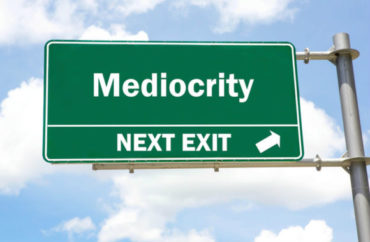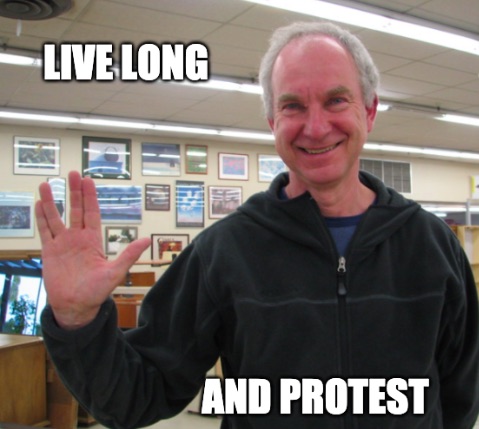
As a mega-fan of science fiction, I was excited to read the recent column by Arizona State University’s Lynette Hrabik, “Students should read and watch more science fiction.”
Unfortunately, like so many other student opinion pieces these days, it focuses on left-wing politics, and specifically in this case the (future) malevolence of an ultra-reactionary right.
 “Dissatisfaction with traditional structures, like capitalism, is apparent among much of Gen Z,” Hrabik writes. “Serious concern surrounds the future of technology, the climate, sustainability, healthcare and a host of other social issues.”
“Dissatisfaction with traditional structures, like capitalism, is apparent among much of Gen Z,” Hrabik writes. “Serious concern surrounds the future of technology, the climate, sustainability, healthcare and a host of other social issues.”
Of course, (science) fiction would be needed to examine “dissatisfaction” with capitalism as, until something like cheap unlimited power (like nuclear fusion) becomes viable, satisfactory alternatives are just that — fiction. Basic history has taught us that much.
Hrabik then uses “The Handmaid’s Tale” as an example of how we can look at contemporary issues, abortion in this instance. However, good science fiction requires a degree of believability. Thirty-five years ago when the story was written — when Moral Majority was a thing — the yarn may have been relevant and perhaps convincing. But a genius named Bruce Miller thought — because Orange Man Bad! — it would be applicable to today, so he developed a TV series based on the book.
It’s difficult to fathom that in 2020 or the near future a second American civil war will result in women being “stripped of their rights” due to a “theocratic government” assuming power. (Joe Haldeman’s novel “The Accidental Time Machine” used a similar plotline, which ruined an otherwise enjoyable story.) And don’t look now, but Miller’s working on the “Handmaid’s Tale” sequel, “The Testaments.” But if Donald Trump loses in November, something tells me Hollywood enthusiasm for this series will wane quickly.
MORE: Prof whines new ‘Spider-Man’ flick isn’t sufficiently diverse
There’s another aspect to a lot of progressive science fiction: It’s way too dark. An article under the ASU Center for Science and the Imagination’s “Project Hieroglyph” makes this very point, stating it plainly in the title: “We’re overdoing dystopian sci-fi.” Indeed, where’s the hope? The positivity?
The original “Battlestar Galactica,” for example, though representative of the dystopia genre, was wholly premised on hope: The “rag-tag fugitive fleet” was searching for mythical Earth after human civilization was eradicated by the robotic Cylons. Here, the Cylons were mechanical replacements for a dying reptilian race. They were, simply, evil. The series even featured a barely veiled God vs. Satan parable in the two-part episode “War of the Gods.”
On the other hand, the 2004 series “reboot” made the Cylons humans’ own creations, and more-than-implied humanity deserved its fate (that is, its annihilation). The early third season directly took aim at the U.S. invasion and occupation of Iraq … because George W. Bush!!
Gene Roddenberry’s vision for “Star Trek” certainly was one of optimism and hope; the Original Series and “The Next Generation” kept true to the ideals of “The Great Bird,” as did other early spinoffs. However, beginning with “Deep Space Nine” and most especially the two modern series “Discovery” and “Picard,” the stories became dark, gritty, and turned Roddenberry’s vision on its head. (To its credit, “DS9” still acknowledged Gene’s values; consider Capt. Sisko’s personal turmoil in “In the Pale Moonlight.”)

Indeed, “Discovery” and “Picard” display more than enough signs that their creators are graduates of the modern academy (and not that of Starfleet). The former shoehorns grievance and racial politics via the reimagined Klingons, and allows underlings and junior officers to openly argue with, and disrespect, their superiors.
As for the latter, well, let this person lay it out for you (but then read this).
If the latest incarnations of “Trek” are two (big) examples of the genre’s takeover by college “studies” majors, don’t forget the “Star Wars” sequel trilogy and especially contemporary comics whose creators and writers shit all over fans and patrons simply for not sharing their politics.
The test of time ultimately will prove contemporary sci-fi, and other entertainment, for what it is: average-to-terrible stuff. Decades from now, who will be looking back fondly at “The Rise of Skywalker” as a classic? At “Star Trek: Discovery” as a trend setter? At Marvel Comics’ 2020 version of the New Warriors as iconic? Hardly anyone, I’d wager.
Oh, one last thing: Using today as a guide, would you say classics such as “1984” and “Fahrenheit 451” (among others) mimic the contemporary right … or left? Who puts forth more effort into controlling our speech, supervising what we read and see, and demanding punishment for wrong-think?
MORE: DC Comics targets young teens with ‘difficult, divisive political issues’
IMAGES: northallertonman / Shutterstock.com; Lenore Edman, James M. / Flickr.com
Like The College Fix on Facebook / Follow us on Twitter






Please join the conversation about our stories on Facebook, Twitter, Instagram, Reddit, MeWe, Rumble, Gab, Minds and Gettr.